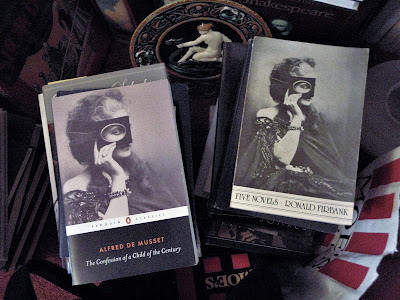No points to the designers for originality, but it does seem like the quintessential image for a certain sort of nineteenth-century attitude.
Recently Oxford University Press was having another sale so I bought a pile of books from the Oxford World's Classics series, even though I've barely made a dent in the previous piles I bought at their previous sales (hence: tsundoku). I noticed that the backs of most of the books had big pull-quotes in red, and looking through them I felt they were a found poem:
Being persuaded that no woman was chaste, he resolved, in order to prevent the disloyalty of such as he should afterwards marry, to wed one every night, and have her strangled the next morning.
At least their lives would remain a protest against those brute forces of society which fill with wreck the abysses of the nether world.
These hours of solitude and meditation are the only time of the day when I am completely myself.
I am not a man, I am dynamite.
Arms and the man I sing of Troy. . .
His rise testifies to the decline of a whole society.
The nearest the general run get to art is Action: sex is their form of art: the battle for existence is their picture.
Read! Your Lord is the Most Bountiful one who taught by the pen, who taught man what he did not know.
For a wondrous power ordains that I shall walk hand-in-hand with my strange heroes for a long time yet, viewing the broad sweep and rapid flow of life, viewing it through the laughter that the world sees and the tears that it neither sees nor suspects.

5 comments:
Even the backs of your books are worried about the election.
V
You HAVE to identify the works from which those quotations come. I recognize the obvious one and a couple more are....vaguely familiar.
Lisa, Hahah, I almost thought of suggesting that people might like to guess . . . I think there are two that are probably pretty obvious. I'll post the titles in a follow-up comment tomorrow!
V: election? was there an election?
OK, by popular demand (one request counts as popular demand around here): a listing of the books that provided the pull-quotes:
(1) Arabian Nights Entertainments, a reprint of the earliest (18th century) translation of Galland's Mille et une Nuit.
(2) The Nether World, George Gissing
(3) Reveries of the Solitary Walker, Jean-Jacques Rousseau
(4) Ecce Homo, Friedrich Nietzsche
(5) Aeneid, Virgil translated by Frederick Ahl
(6) Bel-Ami, Guy de Maupassant
(7) Tarr, Wyndham Lewis
(8) The Qur'an, translated by M A S Abdel Haleem
(9) Dead Souls, Gogol translated by Christopher English
I also bought play collections by Lorca and Seneca, and a collection of the poet John Clare, and then one non-World's Classics book, Our Lady of the Nations: Apparitions of Mary in 20th Century Catholic Europe, but they did not have interesting pull quotes on their backs. Some of these I've read before but I like reading different translations. I've decided that the big, multi-volume work I'll read this year is the newish 3-volume Penguin Classics translation of the Arabian Nights, so this version might be a follow-up.
Post a Comment